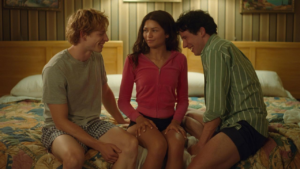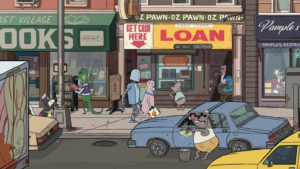Reviewed by GREG KING
Director: Gillian Robespierre
Stars: Jenny Slate, Jake Lacy, Gaby Hoffman, Richard Kind, Polly Draper, Paul Briganti, David Cross.
This debut feature film from writer/director Gillian Robespierre is an extension of her 2009 short film of the same name, which dealt with a one night stand, an unplanned pregnancy and abortion.
This low budget independent film offers a breakout role for little known actress Jenny Slate (from SNL, Parks And Recreation, etc) who plays Donna Stern, an insecure, irresponsible almost childlike 27 year old woman who has a great deal of maturing to do. She is a struggling stand up comic who draws upon her own misfortunes and female bodily functions for her painfully unfunny, frank and revealing, and awkward routines. Her stage presence is quite confrontational and deliberately shocking, but it also makes one cringe to watch her bomb on stage so spectacularly.
But this is a bad week for Donna. She works at the niche Unoppressive Non-Imperialist bookstore which is about to be closed down as its lease has not been renewed. Donna is dumped by her shallow and unfaithful boyfriend Ryan (Paul Briganti) who has left her for a close friend. She even draws on this rejection for a painful stand up routine that has some of her audience walk out of the nightclub. She has a one night stand and rebound sex with handsome nice guy Max (played by Jake Lacy, from the US version of The Office, etc), who is the complete opposite to Donna’s personality. Max is a conservative, neatly dressed, tightly wound Christian and a decent guy, and a more sympathetic character.
But a couple of weeks later Donna discovers that she is pregnant. Emotionally and financially she is unprepared for motherhood. She faces a couple of tough choices – does she have an abortion, and furthermore does she tell Max? These decisions also become part of her stand up routines, which have a confessional quality to them.
Obvious Child is the antithesis of Juno with its frank and honest approach to the difficult topic of abortion seen from a female perspective. But Robespierre handles the topic with sympathy and compassion. She also balances some pathos with raunchy humour and she explores some confronting subject matter in frank and honest fashion. But Obvious Child is not going to have the same sort of broad appeal as Bridesmaids, another female centric romcom, as it lacks big laugh out loud moments, and it will certainly divide audiences. Female audiences in particular may embrace the attitudes and themes of the film, which empowers women to take more responsibility for their own actions and lives.
Donna is a real and credible protagonist and her concerns and problems are grounded in real life, which makes it easier for audiences to empathise with her and her situation. Slate is excellent as Donna, who at times seems a little selfish and unlikeable, but she also captures her vulnerability and unapologetic manner. Slate and Lacy also share a great chemistry that lifts the material, and there is a superb moment when the two drunkenly dance to Paul Simon’s hit song that gives the film its title.
Richard Kind (from Spin City, etc) is a sympathetic figure as Donna’s understanding if slightly eccentric father, while Polly Draper (from thirtysomething, etc) is a little cold and aloof as her overbearing mother. Gaby Hoffman offers solid support as Donna’s best friend Nellie.
As is becomingly increasingly popular with new filmmakers these days Roberspierre largely funded the film through a crowd sourcing campaign. She shot this low budget film in 16 days, but the limitations of the budget, lack of resources and time occasionally show through. Robespierre directs with restraint, and there are no cinematic flourishes or big emotional moments. However, the final shot itself is quite sweet and full of hope and optimism.
★★☆




